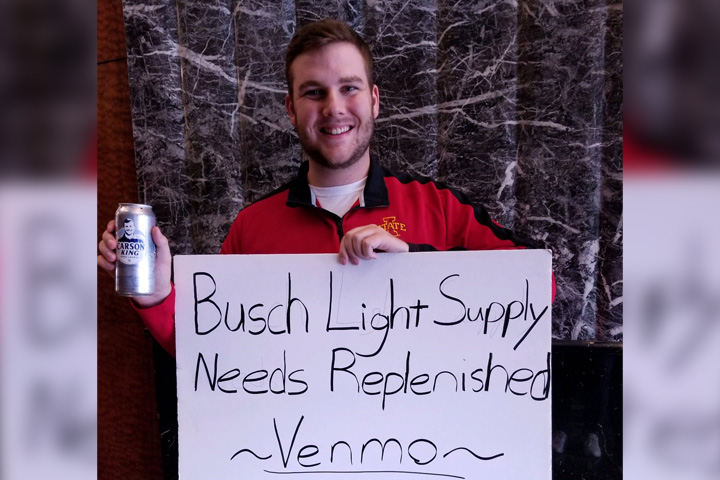The internet comes at you fast.

A U.S. football fan who promised $1 million in donated “beer money” to a children’s hospital has gone from internet hero to villain in 11 days after an Iowa newspaper unearthed two racist tweets he wrote when he was 16.
Carson King, now 24, initially won people’s hearts with a simple handmade sign he held up at ESPN’s College GameDay at the University of Iowa on Sept. 13. The sign encouraged people to help him replenish his “Busch Light supply” by sending money to his Venmo account, a PayPal service for receiving money.
The sign appeared several times on the ESPN broadcast, much to the delight of viewers, who sent him more than US$16,000 in donations. He announced on Sept. 14 that he would donate the money to charity, sparking a torrent of donations that brought his total up to $1.14 million.
Overwhelmed by the donations, King announced that he would donate his viral beer money to the University of Iowa’s Stead Family Children’s Hospital. Beer maker Anheuser-Busch and Venmo responded with promises to match his donation. The brewing company also pledged to give him a lifetime supply of Busch with his face on it.
Then King sat down with the Des Moines Register for a profile interview. The profile was largely positive, although the reporter also questioned King about two racist tweets he sent out when he was a teenager in high school. The tweets emerged during a routine social media background check, the reporter wrote.

Get daily National news
One joke compared black mothers to gorillas, and another made light of black people dying in the Holocaust, the Register reports.
“That’s not something that I’m proud of at all,” King told the Register on Tuesday. He added that the tweets were references to a show, Tosh.0, and that seeing them now made him feel “sick.”
- Mohamed Al-Fayed, whose son died with Princess Diana, accused of multiple rapes
- 12-year-old shoots, kills black bear attacking his dad in Wisconsin
- Hezbollah chief says Israel crossed ‘red lines’ with exploding device attacks
- Yellowstone Park tourist burns leg after going off trail near Old Faithful
He has since deleted them.
“I am embarrassed and stunned to reflect on what I thought was funny when I was 16 years old,” King said in a statement posted by WHO-TV Tuesday night, ahead of the profile’s publication.
“I cannot go back and change what I posted when I was a 16-year-old,” King wrote. “I can apologize and work to improve every day and make a meaningful difference in people’s lives.”
King also apologized on Twitter and defended the Register’s reporter, who has faced backlash for airing the original tweets.
“The Des Moines Register has been nothing but kind in all of their coverage, and I appreciate the reporter pointing out the post to me,” King wrote.
The reaction to his tweets has been swift. Anheuser-Busch cut ties with King on Tuesday, although they promised to follow through with a donation of $350,000 to the hospital.
“Carson King had multiple social media posts that do not align with our values as a brand or as a company, and we will have no further association with him,” the company said in a statement to KCCI.
The Des Moines Register also faced backlash for reporting the eight-year-old tweets, with some accusing the paper of participating in “cancel culture.”
Carol Hunter, the paper’s executive editor, defended her reporter’s decision in a statement published on Twitter. She said the issue sparked intense discussions in the newsroom, but staff ultimately decided to share the information.
“We thought we should be transparent about what we found but not highlight it at the top of the story or as a separate story,” Hunter wrote.
She also pointed out that King pre-empted the paper’s reporting by holding a news conference before the story was published.
King reflected on the double-edged nature of social media in his apology on Tuesday.
“Much of this has happened thanks to social media,” he wrote in his statement. “It has the power to bring people together for a common good. It can also make your life very public.”









Comments